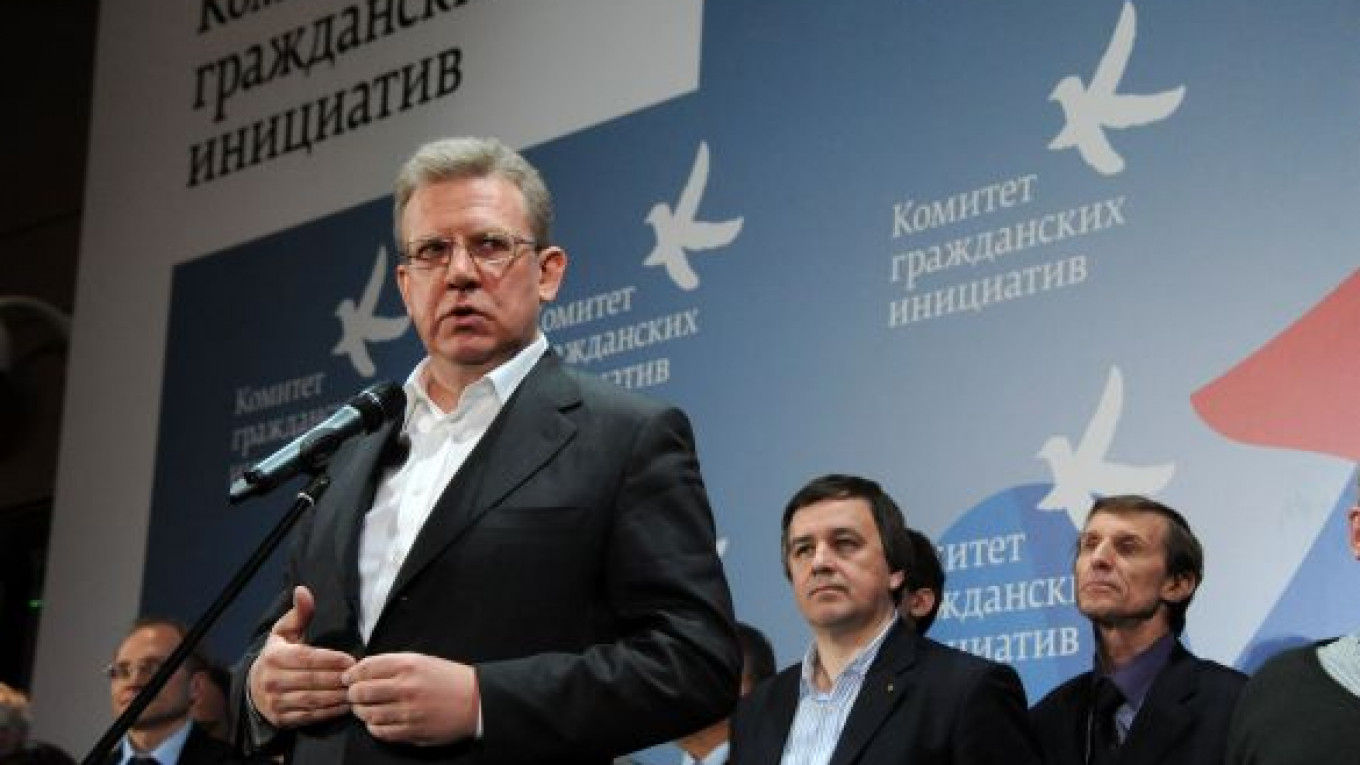Continued protests in Russia will likely lead to a violent backlash or chaotic changes in the government, according to a new study ordered by former Finance Minister Alexei Kudrin from the same think tank that predicted the street protests months before they began.
Released on Thursday, the study lays out four scenarios for the future, but its lead author Mikhail Dmitriyev doubted the gentler option where demonstrations of discontent about the government will subside.
"We believe the chances for this scenario to materialize grew much weaker because both the authorities and protesters are descending into the sinkhole of a confrontation," he said in presenting the study.
Dmitriyev's think tank, the Center for Strategic Research, conducted the polling and analysis in the past three months and produced the study for Kudrin's group of political and economic experts, the Committee of Civic Initiatives.
Things could spiral down into violence and chaos if the government responds too harshly to the ongoing street demonstrations or if the Russian economy slows or dips in the wake of Europe's mounting woes, the study said.
Kudrin described those options as "realistic" in comments at the study's presentation.
Police have been detaining protesters who established roving camps around the city center in recent weeks. A bloody clash took place during the May 6 opposition march that ended at Bolotnaya Ploshchad.
"After the dispersal of the rally at Bolotnaya, the aggression of the protesters and their determination to carry on are on the rise," the study concluded.
A further crackdown on the protests would put at their head the more extreme members, such as radical leftists, anarchists and nationalists, the study said.
It said another wave of the global economic crisis, if triggered by the Greek debt crisis, would slash energy prices that are key to filling the Russian budget. Coupled with the protests, the need for austerity would undermine the government and prompt its hasty "transformation."
Dmitriyev didn't elaborate on what kind of changes would happen to the government in such a scenario.
The likelihood that the Greek debt crisis could affect Russia is 50 percent, Kudrin said. He said the euro zone had already slid into recession.
The final scenario is for the protesters and the modernizers in the government to agree on some changes and pull them off, according to the study.
Although the study said that was unlikely, Kudrin insisted it could still happen. Prime Minister Dmitry Medvedev and his Cabinet could lead the dialogue, and President Vladimir Putin could support reasonable proposals, Kudrin said.
Economist Yevgeny Gontmakher, a member of the Committee for Civic Initiatives, said the government's dilution of the idea of free gubernatorial elections pointed to the impossibility of a dialogue.
Then-President Medvedev proposed a bill to reintroduce elections for regional chiefs, but it later included clauses that severely restrict — if not rule out — opposition candidates from the races.
Future political leaders could appear from the regions, the study found. Alexei Navalny led polls of focus groups asked to select the country's president from among opposition figures out of the spotlight of state-controlled media.
In a surprise, Vladimir Yegorkin from the Moscow region town of Chernogolovka finished second, Dmitriyev said. Yegorkin is the leader of a local grassroots organization.
Navalny, however, pales in terms of approval ratings when compared to businessman Mikhail Prokhorov, Deputy Prime Minister Dmitry Rogozin and Kudrin. That is because people prefer more experienced leaders, Dmitriyev said.
It will be hard for Prokhorov to expand his support base because "most people" feel persistently negative about oligarchs, the study said.
A Message from The Moscow Times:
Dear readers,
We are facing unprecedented challenges. Russia's Prosecutor General's Office has designated The Moscow Times as an "undesirable" organization, criminalizing our work and putting our staff at risk of prosecution. This follows our earlier unjust labeling as a "foreign agent."
These actions are direct attempts to silence independent journalism in Russia. The authorities claim our work "discredits the decisions of the Russian leadership." We see things differently: we strive to provide accurate, unbiased reporting on Russia.
We, the journalists of The Moscow Times, refuse to be silenced. But to continue our work, we need your help.
Your support, no matter how small, makes a world of difference. If you can, please support us monthly starting from just $2. It's quick to set up, and every contribution makes a significant impact.
By supporting The Moscow Times, you're defending open, independent journalism in the face of repression. Thank you for standing with us.
Remind me later.






